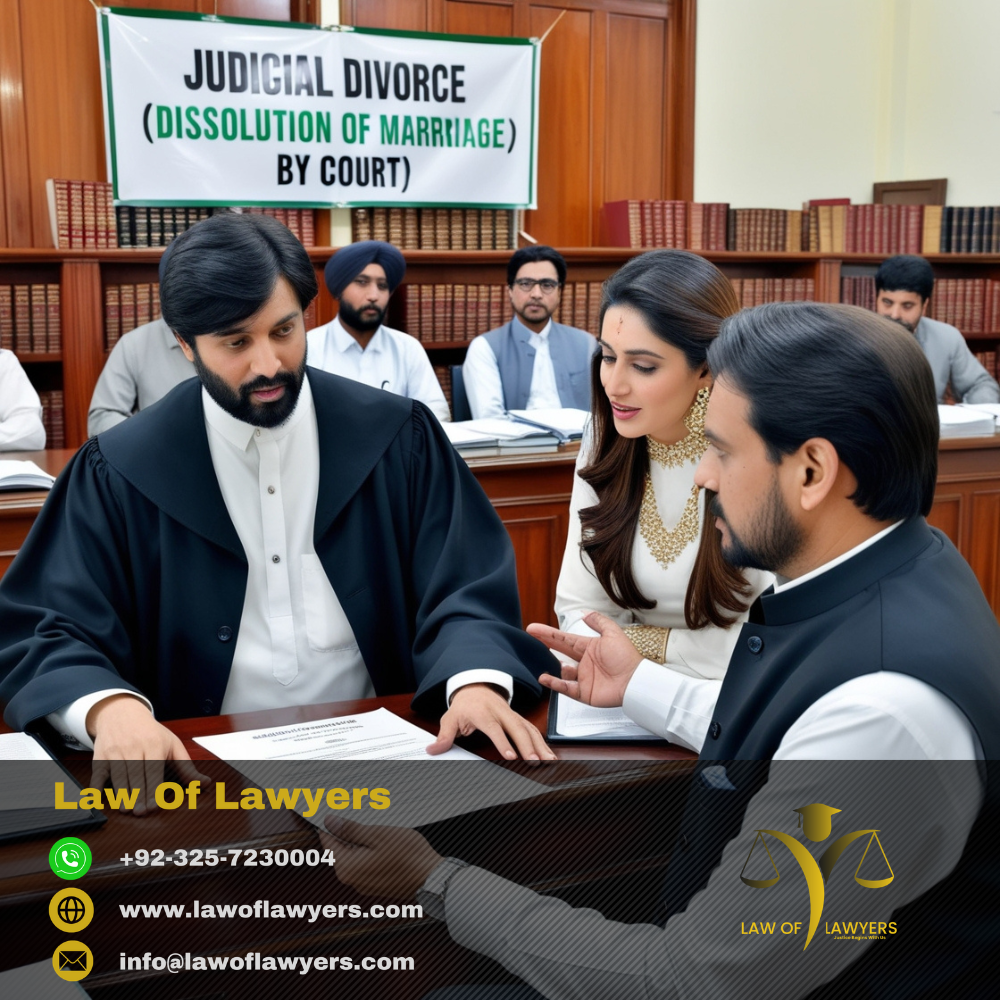The best online divorce service describes divorce under Pakistan’s Muslim Family Laws Ordinance 1961 as “the legal dissolution of a marriage, which terminates the rights and obligations of husband and wife based on Islamic principles and statutory laws.
Divorce, or “Talaq” in Pakistan, refers to the legal dissolution of a marriage under Islamic law and the statutory laws of the country. It is a formal process by which a married couple can end their marital relationship, resulting in the termination of marital rights and obligations between them. The process of divorce can be initiated by either the husband or the wife and involves specific legal and religious procedures to ensure that it is conducted fairly and justly.
In Pakistan, divorce is governed by both Islamic principles, as outlined in the Quran and Hadith, and the laws enacted by the state, such as the Muslim Family Laws Ordinance of 1961. The legal framework ensures that the rights of both parties are protected.
Divorce can be initiated through various means, including unilateral pronouncement by the husband, mutual agreement, or judicial decree. The process typically involves arbitration or mediation efforts to encourage reconciliation before the final dissolution of the marriage
In Pakistan, the legal system recognizes several types of divorce, each based on Islamic principles and statutory laws. These include Talaq (divorce by the husband), Khula (divorce by the wife), Mubarat (mutual divorce), Judicial Divorce (dissolution of marriage by the court), and Faskh (annulment by the court). Each type has its own procedures, legal requirements, and implications.


Talaq is the most common form of divorce initiated by the husband. It can be pronounced in three different ways:
The husband pronounces Talaq once during a period of purity (when the wife is not menstruating) and observes a waiting period (iddah) of three menstrual cycles. If reconciliation does not occur, the divorce becomes final.
The husband pronounces Talaq three times during three consecutive periods of purity. If reconciliation fails after the third pronouncement, the divorce becomes final.
(Triple Talaq): The husband pronounces Talaq three times in one sitting, immediately dissolving the marriage. This form is less preferred and controversial.
PLJ 2014 SC 772
PLJ 2014 Supreme Court 772 this case explain that a divorce pronounced by a man is considered valid only when the necessary legal procedures are strictly followed. This includes compliance with all legal requirements, such as providing written notice to the relevant authorities and ensuring proper documentation. Failure to adhere to these procedures can render the divorce ineffective or legally disputed. If you want to ensure a properly executed and procedural divorce, contact us now for expert guidance and assistance.
Intrigued by the intricacies of Islamic law and its application in modern legal systems? To delve deeper into the court’s reasoning, the full judgment, and the potential implications of this ruling on future cases, click the link to access the complete case details. Discover how this decision might shape legal perspectives on marriage and dower in Pakistan and beyond.
Surah At-Talaq (65:1):
يَا أَيُّهَا النَّبِيُّ إِذَا طَلَّقْتُمُ النِّسَاءَ فَطَلِّقُوهُنَّ لِعِدَّتِهِنَّ وَأَحْصُوا الْعِدَّةَ وَاتَّقُوا اللَّهَ رَبَّكُمْ لَا تُخْرِجُوهُنَّ مِنْ بُيُوتِهِنَّ وَلَا يَخْرُجْنَ إِلَّا أَنْ يَأْتِينَ بِفَاحِشَةٍ مُبَيِّنَةٍ وَتِلْكَ حُدُودُ اللَّهِ وَمَن يَتَعَدَّ حُدُودَ اللَّهِ فَقَدْ ظَلَمَ نَفْسَهُ لَا تَدْرِي لَعَلَّ اللَّهَ يُحْدِثُ بَعْدَ ذَٰلِكَ أَمْرًا
Translation
“O Prophet, when you [Muslims] divorce women, divorce them for their waiting period and keep count of the waiting period. And fear Allah, your Lord. Do not turn them out of their homes, nor should they leave unless they commit a clear immorality. And those are the limits of Allah. And whoever transgresses the limits of Allah has certainly wronged himself. You do not know; perhaps Allah will bring about after that a different matter.”
This verse establishes the man’s right to divorce, while also outlining the process and responsibilities associated with it.
PLJ 2024 Cr.C. 478 (FB)
The case of Haji Saif-ur-Rahman Shaheen vs. Islamic Republic of Pakistan, heard in the Federal Shariat Court, addresses the complex issue of khula (divorce initiated by the wife) in Islamic law. This landmark decision examines the right of women to seek dissolution of marriage through khula and clarifies misconceptions surrounding this practice.
The case revolves around a petition challenging a family court’s decree of khula based on Section 10(5) of the West Pakistan Family Courts Act, 1964 (Amended 2015). The petitioner argued that khula is not an absolute right of women and requires the husband’s consent. However, the Federal Shariat Court dismissed the petition, affirming that khula is indeed a fundamental right granted to women by Islam. The court clarified that if a wife willingly returns her mahr (dowry) and states she cannot live with her husband within the limits prescribed by Allah, the court should grant a decree of khula without delay.
Are you interested in exploring the intricate balance between religious principles and modern legal systems? This case offers a fascinating glimpse into the interpretation of Islamic law in contemporary Pakistani courts. To delve deeper into the court’s reasoning, the Quranic verses and Hadiths cited, and the potential implications of this ruling on future cases, click the link to access the complete case details. Discover how this decision might shape legal perspectives on marriage and divorce in Islamic jurisdictions.
Surah Al-Baqarah (2:229)
لَا تَحِلُّ لَكُمْ أَنْ تَأْخُذُوا مِمَّا آتَيْتُمُوهُنَّ شَيْئًا إِلَّا أَنْ يَخَافَا أَنْ لَا يُقِيمَا حُدُودَ اللَّهِ
Translation
“It is not lawful for you (men) to take back any of your gifts (from your wives), except when both parties fear that they would be unable to keep the limits ordained by Allah.”


The Supreme Court of Pakistan’s Civil Petition No. 3209 of 2019, the Court acknowledged the importance of mutual consent in matrimonial matters, emphasizing that the marital relationship is based on mutual trust between wife and husband.
In Pakistan, mutual divorce is recognized under Islamic law and (Section 8) of the Muslim Family Laws Ordinance, 1961.
Surah An-Nisa (4:128):
وَإِنِ ٱمْرَأَةٌ خَافَتْ مِنۢ بَعْلِهَا نُشُوزًا أَوْ إِعْرَاضًا فَلَا جُنَاحَ عَلَيْهِمَآ أَن يُصْلِحَا بَيْنَهُمَا صُلْحًۭاۚ وَٱلصُّلْحُ خَيْرٌۭۗ وَأُحْضِرَتِ ٱلْأَنفُسُ ٱلشُّحَّۚ وَإِن تُحْسِنُوا۟ وَتَتَّقُوا۟ فَإِنَّ ٱللَّهَ كَانَ بِمَا تَعْمَلُونَ خَبِيرًۭا
Translation
“And if a woman fears from her husband contempt or evasion, there is no sin upon them if they make terms of settlement between them—and settlement is best. And present in [human] souls is stinginess. But if you do good and fear Allah—then indeed Allah is ever, with what you do, Acquainted.”
This verse underscores the importance of mutual agreement and settlement in resolving marital disputes, allowing for a peaceful resolution or separation if necessary.
“If a wife fears cruelty or desertion on her husband’s part, there is no blame on them if they arrange an amicable settlement between themselves.”


In “Mst. Zahida vs. Muhammad Nawaz” (PLD 2001 Lahore 1), the court annulled the marriage due to the husband’s fraudulent behavior.
“When you divorce women and they fulfill the term of their (Iddat), either take them back on equitable terms or set them free on equitable terms; but do not take them back to injure them (or) to take undue advantage.”
These types of divorce ensure that both men and women in Pakistan have legal avenues to dissolve marriages that are no longer sustainable, while adhering to Islamic principles and ensuring justice and fairness for both parties.
Online Divorce allows you to initiate and complete your divorce process online. Once you begin, we handle all necessary coordination with the relevant authorities and individuals to ensure the process is completed from start to finish. Online Divorce, whether it’s an Online talaq or Online khulla (Arabic for “The untying of the knot“), refers to the dissolution of a marriage. Ending a marriage is often a difficult, painful, and stressful experience for everyone involved.
However, sometimes it is the only path forward. At Law Of Lawyers, we understand this and offer services for those who wish to carry out this process online. Our team of experienced divorce lawyers will take the time to understand your situation and circumstances, providing the best possible approach to Legally and Ethically bring the relationship to a close in an amicable manner.


The following documents are required when you are considering to get your khula/ Court Decree from Family courts of Pakistan.
Please note that if you are unable to meet the required documents then feel free to contact us we will arrange those documents.
The following documents are required when you are considering to register your divorce in Nadra union council.

An online divorce lets individuals complete divorce proceedings digitally, submitting documents online, making it easier for those abroad or in remote areas. It must meet legal requirements and can include services like NADRA for documentation.
Yes, you can file for divorce online through Law of Lawyers, which assist Overseas Pakistanis and Foreign National Citizens in processing divorce applications and generate divorce Certificate.
Yes, Law of Lawyers can provide Divorce Services both Online and Offline, offering flexibility to clients based on their preferences and location.
Yes, an online divorce is legally recognized in Pakistan if it follows the proper legal procedures and is registered with the relevant authorities, such as NADRA.
The online divorce from court process may take several weeks, Law of Lawyers complete the divorce process quickly and generate court divorce decree within one month.
Yes, a Foreign National Woman can get a Divorce without coming to Pakistan. The process can be completed online via E-Courts or a Special Power of Attorney.
No, you don’t need to appear in court, as the process can be handled online. You just need to contact Law of Lawyers for your divorce.
Yes, once the divorce is processed and approved, you can obtain a divorce certificate from NADRA through Law of Lawyers without coming to Pakistan by giving us a Special Power of Attorney.
Typically, you will need your marriage certificate, your national identity documents or passport, proof of residence abroad, and any additional documents requested by the legal service provider.
Yes, Law of Lawyers, offer assistance in multiple languages to cater to the needs of overseas Pakistanis or Foreign Citizens.
Navigate the complexities of divorce with ease. Our expert team at Law Of Lawyers ensures a smooth online process, handling all legalities for you. Book a free consultation today and find peace of mind.
Benefit from over 25 years of legal experience. Our seasoned attorneys are here to navigate you through every legal challenge.
We tailor strategies to meet your specific needs. Your case is unique and so is our approach to resolving it.
Track record of countless successful cases. Trust in our ability to deliver winning outcomes for our clients.
Your interests and rights are always our top priority. We work diligently to ensure you receive the best possible representation.